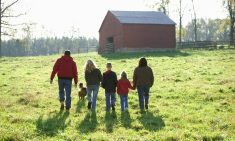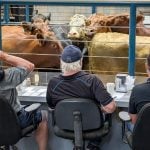As farms grow, they get connected to more people with more kinds of expertise and they get linked into more and wider networks than ever. The immediate goal may be to get on top of a problem that’s in front of them today, but almost inevitably this helps them see more opportunities, and it opens up new possibilities to add additional enterprises or business ventures to the farm.
It can also set the scene for a meltdown.
At Aberhart Farms Inc., Terry Aberhart follows two guiding principles that he believes are crucial to the success of every business: Do what you love, and surround yourself with amazing people.
Read Also

‘No agenda, no attenda’: How to professionalize your family farm meetings
Establishing meeting ground rules can help a farm family find ways to communicate that work for the business and the family.
By really internalizing these, Aberhart and his family have built Aberhart Farms Inc. into a multi-enterprise business. They have avoided that meltdown, and grown gross revenues to 27 times from what they were 20 years ago.
Along with other family members, Aberhart is involved in multiple businesses that operate from their 16,800-acre grain farm at Langenburg, a couple hours east of Regina. These include agronomy and precision ag companies and, recently, a podcast.

It can look like a maze, except there’s another golden rule for Aberhart. Each new enterprise must have synergy with the core farm business and its mission.
“If you’re going to be involved in multiple businesses, I think there has to be some kind of synergy into your larger purpose,” Aberhart says. “Maybe those purposes are just pure diversification, but to me if there’s no kind of synergy or synergistic benefit between the companies in some way, then that’s something I would think about.”
Plus, the new enterprise must drive Aberhart Farms and its “Growing our future” mission. “Our viewpoint is, we want to make things better for the next generation,” Aberhart says.
“What’s really important to growth and managing multiple businesses is having clarity on where you’re going and why … we want to continue to improve and innovate and do that in a collaborative way.”
[RELATED] A farm advisory team that works — for you
From the start
Aberhart started his career as an ag mechanic while farming part-time with his dad, Harvey, but soon decided he wanted to farm full-time.
“Dad always worked off the farm as well, and we had about 1,500 acres, and I got to a point where I said, ‘Dad, I don’t want to do what you did all your life. I don’t want to work two jobs,’” Aberhart says. “We rented another 1,500 acres to get to 3,000 and I went farming full-time at 20 years old, and my dad stayed at his off-farm job. It was the opposite of a lot of farm family relationships. I know people of my age that still haven’t got the reins from their parents, but in a sense, I got the reins handed to me when I was very young and we started growing the business.”
Believing that the most important thing was to grow an amazing crop, Aberhart began to learn more about agronomy, which ultimately led him to Rob Saik’s Agri-Trend company, and Aberhart’s own agronomy consulting business that he ran alongside the farm operation.
“Agri-Trend had a system and a structure in place to help me do that, and it was an awesome opportunity to learn more about how to grow better crops myself while helping other farmers,” Aberhart says.
By this time (2006), the farm had grown to 7,000 acres and Aberhart convinced his dad to quit his off-farm job and farm full-time.
“Again, it’s not the way things usually go, but we decided we were going to keep growing this business.” Says Aberhart: “I’m a visionary person, like a lot of farmers and entrepreneurs are, and through my work with Agri-Trend, I got exposed to amazing, passionate people that were doing cool things in the industry.
“When you surround yourself with those types of people, and with people that have all been more successful than you, and are smarter than you, you just naturally grow along with them. So, purposely, I have surrounded myself with people much smarter than me all of my life.”
The farm was used as a research site to help develop some precision agronomy processes and tools, and that work led Aberhart, his brother Dan and father Harvey to meet a manufacturer of an elemental sulphur product called Bio-Sul that they distribute throughout Western Canada via a third business that the three own together called Aberhart Ag Solutions.
[RELATED] Alberta Farmer Express: It’s cheap and plentiful but is elemental sulphur a fertilizer option?
How to manage it all?
How does Aberhart manage so many different enterprises and not get burned out?
“I just focus on doing what I really love to do and getting the right people around me that want to support that,” he says.
“The reality is when you try to do all those other things that you’re not good at, it causes a lot of stress and chaos for your team and it’s not fair to anybody.”

He admits he has struggled to take his own advice on this at times, often not wanting to delegate a job he didn’t want to do himself because he’d feel guilty about it.
“I would never hand off the things that I hated because I’m like, I don’t want to give somebody this crap job that I don’t want to do. That would be kind of like a jerk boss, right?” he says. “But I have realized that a lot of people don’t want to do the things that I like to do, and you realize this person would actually love doing the thing that I suck at, while the thing that I liked and wanted to give to them actually stresses them out.”
Aberhart has taken executive management training programs like TEPAP and has also attended the Strategic Coach program, and one of the big take-aways has been that every business owner he has ever met is focused on human resources.
“I realized if we can figure out how to manage people better, how to attract the most amazing people or retain the most amazing people, and build a good culture and environment, we’d have a strategic advantage over anybody out there,” Aberhart says.
[RELATED] Do you have a plan to learn?
Creating shifts
It also leads to an answer for a huge question that is growing in urgency on more and more farms.
If every time you take on a new enterprise, it means you’re adding to your own workload, how can that be sustainable?
Unless it’s solved, it’s a problem that doesn’t go away. It just gets worse.

Farmers know they are already over-worked and over-scheduled, and there just aren’t enough hours in their days.
“We recognize that one of the biggest challenges of HR is farmers believe everyone should work the way we do and the simple reality is no one will,” Aberhart says. “If you hire people and expect them to work the way the owner does, they will do that for a few years and leave because they’re burnt out, their families never see them. Even if they love working on the farm but the rest of the family isn’t supportive, they’re not going to stay.”
Aberhart Farms has been working hard over the past few years to create work shifts that allow everybody to have some time off, even during the busiest seasons. “Everybody” means everybody.
So, at one end, the Aberharts have set up a spray schedule through the middle of the summer so people can book holidays with their family. They also have a family-first policy, so if someone’s child gets sick at school, picking them up takes priority and everyone else covers.
And it goes right through the organization. Everyone gets regular days off. That includes Terry, who gets Saturday and Harvey, who has Sundays.
Establishing regular shifts and days off for everyone has not been easy because, as every farmer knows, there are times when the sun shines and you have to make hay. In fact, it still isn’t always easy, and the system isn’t always perfect, but it’s a big step in the direction of having a team that is productive, engaged and happy.
No one knows the benefit of that better than Terry himself.
“I used to be one of these guys who would brag that I had just done a 24-hour shift on the seeder,” he says. “We have this mentality in agriculture where we celebrate the fact that we can outwork somebody else. That’s (the) most idiotic thing ever. Do we want to be celebrating the fact that I just ran a drill for 24 hours without sleeping? … The last few years we’ve been kind of changing our mentality around that.”
Instead, Aberhart Farms has been working hard to create work shifts that allow everybody to have some time off, even during the busiest seasons.
“At first it was a struggle for us to be okay with that,” Aberhart says. “My dad was feeling guilty to be going to church when all the combines are running. And me too, sometimes I would go to the lake fishing and hope the neighbours didn’t see me because all the combines are running.
“But shouldn’t we be proud, shouldn’t we be celebrating the fact that we have a team and a system so that I can take a day off to spend with my kids and recharge and come back to work refreshed.”
Why do it all?
Another question Aberhart gets asked a lot is: why does he do so many different things?
“I believe entrepreneurs do things for two reasons. One, because they want to. And two, because they can,” he says. “If you believe that you can accomplish something, if you can believe you can build a business in an environment where people would love to come to work and do what they love every day and support their families; if you believe that you could help improve things for the future generations and the industry … how can you not try?”
Anyone trying to grow multiple businesses needs to be clear about structure, communication and processes. Aberhart is still working on them all. The job is never done. But he also sees progress. “We’ve worked at it hard for 15 years … the last five years we’re starting to understand the value and benefits of what we’ve been doing.”
Reach for More
There’s nothing simple in farming. Nor are there any guaranteed simple ways to add a business to the farm. Yet Terry Aberhart feels that for his own farm, he’s learning some of the core rules, and how to put them into action as well.
Following are Aberhart’s observations on how to manage multiple enterprises, ensure they are successful, and maintain your sanity.
1/ FOCUS ON YOUR OWN UNIQUE ABILITIES AND BRING IN OTHER PEOPLE WHO ARE BETTER THAN YOU AT THE JOBS YOU DON’T DO WELL
“Everybody has strengths and weaknesses, and there’s no point in working on your weakness because there’s things that each one of us are really amazing at,” Aberhart says. “Focus on that and do it really well and find the people that are amazing at things that you suck at. High-level farmers recognize that even if they’re really good at something, they couldn’t really be as good as somebody that does it every day, all day long. I strongly believe in surrounding yourself with experts and advisors and leveraging that.”
2/ BE CRYSTAL CLEAR ABOUT YOUR VISION AND PURPOSE
“What are your goals, where do you want to go? Be specific and clear as you can about that,” he says. “What are the values that guide your decisions? I always find that even if today it feels like the world is falling and you’re not going to make it through, seeing where you are going long term, there is a purpose, a north star to keep driving towards. When you don’t have that purpose and clarity, and you don’t have those core values to help guide those tough decisions, it just gets hard.”
3/ DON’T TRY TO MULTI-TASK
Make sure you know yourself and your own abilities because if you multi-task, you won’t do anything really well. “The reality is the more focused you get, the better it is,” Aberhart says. “Be really clear on what your unique value is, what are you really good at and try to do as much of that as possible.”
4/ FIND GOOD MENTORS, ADVISORS AND/OR COACHES
“Most decisions that I make are influenced by a lot of very intelligent people,” Aberhart says. “They are largely made with good advice, and it’s way easier to make those decisions between you and your family, or other shareholders or partners. Even if the decision goes bad, the onus isn’t all on you, you have made the decision collectively together and you did the best thing that you could at the time. When you make those decisions on your own and it doesn’t go well, you can be really hard on yourself. I’ve been there lots too, so I don’t want to put myself in that position anymore, I just don’t need to.”
5/ DIVERSIFY BY BEING GOOD AT WHAT YOU DO
“We could farm grain and decide to add cattle to diversify and there’s some synergies between grain and cattle, but you also have to evaluate, if I put the same time and effort required to add cattle to the operation into higher-level agronomy and growing another 10 bushels, and managing the current business I have to a higher level, what would the result be?” Aberhart says.
6/ STEP BACK AND LOOK AT THE BIG PICTURE
“You need to understand why you are doing things,” Aberhart says. “I have recognized that one of my unique abilities is seeing the big picture, looking into the future, and putting all the pieces together. I’m good at building the teams that build the dream. It’s my natural ability to help create an opportunity or a structure out of an idea and start building a team that can make that opportunity or dream come true.”
7/ BE OPEN TO CONSTRUCTIVE FEEDBACK
“When someone tells us they interpret something differently or thinks something else, it’s usually hard and we take it personally, but for me it comes back to core values,” Aberhart says. “I’ve surrounded myself with people that are successful and aligned to the values that I have. They care about family, they care about making the world a better place, they care about doing what they love and they’re amazing people. There are successful people I know that don’t align with my core values and I don’t seek out their advice for that reason.”
8/ INSPIRE PEOPLE
“People want to be valued, and there’s a lot of other things you can do besides give people money,” says Aberhart, who won’t use the word “employee”.
“I always use the word team,” he says. “I don’t like the word employee because to me there is no cut and dried hierarchy. Everybody’s part of our team and their families are part of our team because they’re allowing their husband or wife or child to come to work and sometimes be away longer hours. We try to reward, thank and celebrate them too.”
















